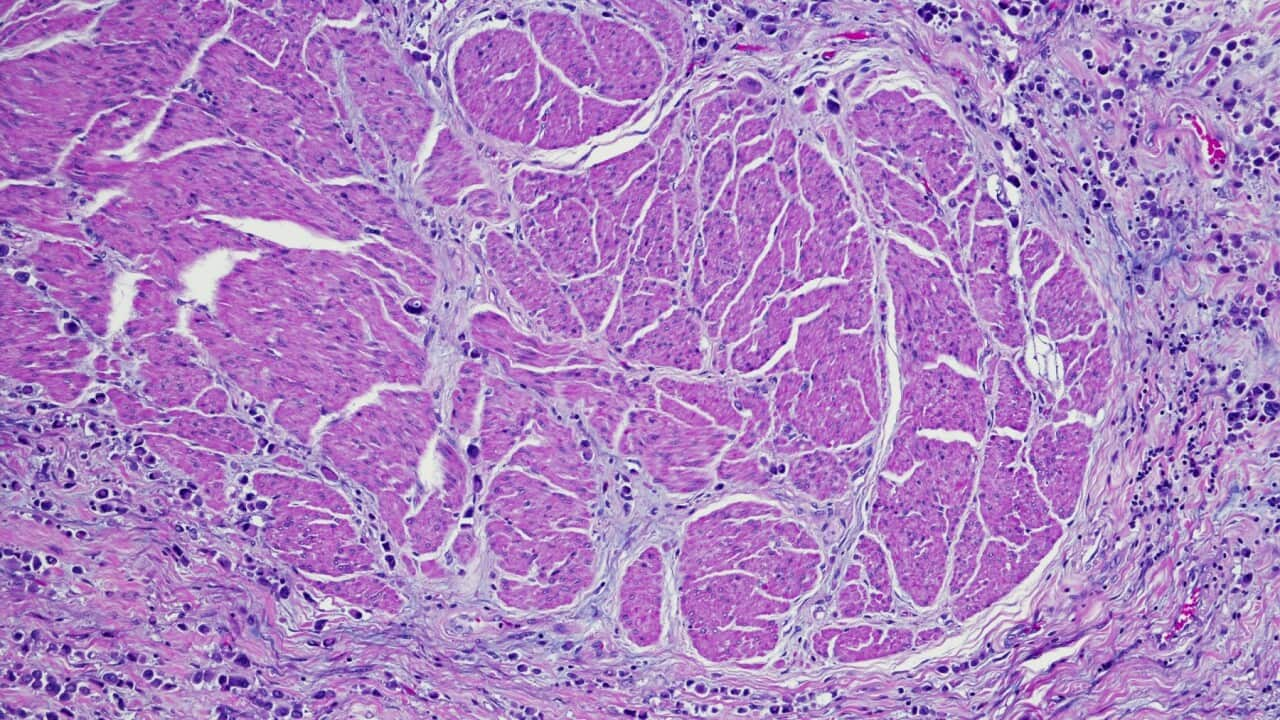TRANSCRIPT
'Slipping through the cracks' - that's how advocates are describing the outcomes for people diagnosed with a rare cancer in Australia, who are facing a declining survival rate.
A latest report from advocacy body Rare Cancers Australia reveals a stark difference in health outcomes depending on the rarity of the cancer.
The five-year survival rate is for common cancers is around 77 per cent.
Less common cancers have a survival rate of about 62 per cent.
But for people with rare cancers the figure has plummeted to just 45 per cent.
Advocates say the government is not doing enough to bridge the gap.
Federal Health Minister Mark Butler has launched the Rare Cancer Moonshot report.
The report calls for urgent action across government, healthcare, research, industry, and the community to radically accelerate progress by 20-35.
"We celebrate that we have one of the most equitable healthcare systems on the planet but we don't rest on the laurels. We recognise there are so many areas, I talked about the Indigenous and non-Indigenous Australians but there are so many other areas where we can do so much better to achieve equity. And cancer is one of them. And this report brings the spotlight back into the way in which we can do better for Australians who are living with rare and less common cancers."
The government regulator, the Therapeutic Goods Administration, sets a very tough standard for clinical trial data.
While this may seem like a step in the right direction, it also means treatments for smaller groups of patients - such as those with rare cancers - may never meet the required evidence threshold.
This potentially results in pharmaceutical companies being disincentivised from seeking a listing on the P-B-S, or Pharmaceutical Benefits Scheme, which then means they miss out subsidies for the therapies they need.
For some rare diagnoses such as bladder, urethral and eye cancers, improvements in survival have slowed or even declined.
"This report is one of those great opportunities for stakeholders to come to parliament and to continue to press us, to be more ambitious and to do even better than we have shown we can do over the last 20 or 30 years in improving mortality rates and more importantly survival rates as well."
Australians with rare and less common cancers also often struggle to access treatments due to bureaucratic and cost barriers.
The report states the rare cancer diagnosis is a more laborious process, with multiple G-P and specialist appointments for tests that are often not subsidised.
Noel Carmona is based in the Upper Hunter region, and lives with stage 4-b thymic carcinoma, a rare cancer which he was diagnosed with in February last year.
The rarity of his cancer left Mr Carmona facing huge financial pressures.
"I did go through a type of treatment called immunotherapy but for me and my wife, every week we had to fork out $2,944, just for the treatment for every three weeks. So the argument there is why did I have to pay that amount of money for being diagnosed with a rare cancer whereas someone with a common cancer for instance, for example breast cancer, where they don't have to pay that amount of money for that same drug - which they can access."
People with rare or less common cancers comprise one-third of Australia's total cancer deaths.
Treatments for rare cancers are less accessible and specialist expertise is usually centralised.
This sometimes leaves patients in a tricky situation where they have to travel further to receive the appropriate care.
Anne Ruston is the opposition's spokeswoman on Health and Aged Care.
She says people need to understand the broader implications of this issue and the challenges it presents to the patients' families.
"We all need to do better around understanding the broader implications, the psychological impact on the individual but also the impact it has on the families, particularly when we are dealing with younger people and children who have a cancer diagnosis and understanding the impact that the diagnosis has on the broader family. The impact it has on the siblings and their development and that there is a broader piece around the references that we really do need to make sure we are delivering hand on heart (sincerely) the best possible care that we can to Australians who find themselves unfortunately with cancer diagnosis."
The Rare Cancer Moonsheet report urges the government to deliver all 41 recommendations of a Senate inquiry into rare and less common cancers, invest more in clinical trials and telehealth, and develop a national genomics strategy.
Noel Carmona hopes the development of rare cancer therapies improve in the near future - easing the financial commitments for other rare cancer patients.
I'm hoping that one day down the track, or for the future, someone that gets diagnosed more or less with the same cancer as what I've got don't have to go through that, that financial burden that I went through."













